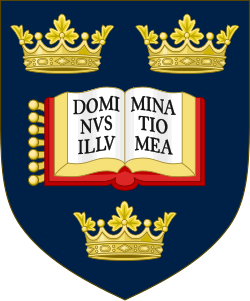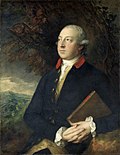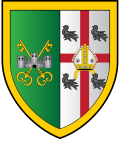Portal:University of Oxford
| Main page | Indices | Projects |
The University of Oxford portal
The University of Oxford is a collegiate research university in Oxford, England. There is evidence of teaching as early as 1096, making it the oldest university in the English-speaking world and the second-oldest continuously operating university globally. It expanded rapidly from 1167, when Henry II prohibited English students from attending the University of Paris. When disputes erupted between students and the Oxford townspeople, some Oxford academics fled northeast to Cambridge, where they established the University of Cambridge in 1209. The two English ancient universities share many common features and are jointly referred to as Oxbridge.
The University of Oxford comprises 43 constituent colleges, consisting of 36 semi-autonomous colleges, four permanent private halls and three societies (colleges that are departments of the university, without their own royal charter). and a range of academic departments that are organised into four divisions. Each college is a self-governing institution within the university that controls its own membership and has its own internal structure and activities. All students are members of a college. Oxford does not have a main campus. Its buildings and facilities are scattered throughout the city centre and around the town. Undergraduate teaching at the university consists of lectures, small-group tutorials at the colleges and halls, seminars, laboratory work and tutorials provided by the central university faculties and departments. Postgraduate teaching is provided in a predominantly centralised fashion.
Oxford operates the Ashmolean Museum, the world's oldest university museum; Oxford University Press, the largest university press in the world; and the largest academic library system nationwide. In the fiscal year ending 31 July 2024, the university had a total consolidated income of £3.05 billion, of which £778.9 million was from research grants and contracts. In 2024, Oxford ranked first nationally for undergraduate education.
Oxford has educated a wide range of notable alumni, including 31 prime ministers of the United Kingdom and many heads of state and government around the world. As of October 2022,[update] 73 Nobel Prize laureates, 4 Fields Medalists, and 6 Turing Award winners have matriculated, worked, or held visiting fellowships at the University of Oxford. Its alumni have won 160 Olympic medals. Oxford is home to a number of scholarships, including the Rhodes Scholarship, one of the oldest international graduate scholarship programmes in the world. (Full article...)
Selected article
The main buildings of Jesus College are located in the centre of Oxford between Turl Street, Ship Street, Cornmarket and Market Street. Jesus College was founded in 1571 by Queen Elizabeth I, upon the petition of a Welsh clergyman, Hugh Price. The foundation charter gave to the college the land and buildings of White Hall, a defunct academic hall, to which new buildings were added. The first quadrangle, which included the hall, chapel, and principal's lodgings, was completed between 1621 and 1630; it has been described as "small and pretty" and possessing "a curious charm". Construction of the second quadrangle began in the 1630s and was completed in about 1712. Further buildings were erected in a third quadrangle during the 20th century, including science laboratories, a new library, and additional accommodation. The chapel was extensively altered in 1864; one historian of the college described the work as "ill-considered". The Fellows' Library, restored in 2007, contains 11,000 antiquarian books. A project to build new student and teaching rooms opposite the college was completed in 2010. Eleven parts of the college are listed buildings. (Full article...)
Selected biography
Thomas Pennant (1726–1798) was a Welsh naturalist, traveller, writer and antiquarian. He was born and lived his whole life at his family estate, Downing Hall. In 1744 he entered The Queen's College, Oxford, later moving to Oriel College. Like many students from a wealthy background, he left Oxford without taking a degree, although in 1771 his work as a zoologist was recognised with an honorary degree. As a naturalist he had a great curiosity, observing the geography, geology, plants, animals, birds, reptiles, amphibians and fish around him. He wrote acclaimed books including British Zoology, the History of Quadrupeds, Arctic Zoology and Indian Zoology although he never travelled further than continental Europe. He knew many of the scientific figures of his day. His books influenced the writings of Samuel Johnson. He visited and wrote about Scotland and other parts of Britain. Many of his travels took him to places that were little known to the British public and his travelogues, accompanied by colour plates, were much appreciated. He was an amiable man with a large circle of friends and was still busily following his interests into his sixties. (Full article...)
Selected college or hall
St Peter's College became a college in 1961, having existed as "St Peter's Hall" since 1929. It is on New Inn Hall Street, on the site of two of the university's oldest academic halls, New Inn Hall and Rose Hall, founded in the 13th century. St Peter's was founded by Francis Chavasse, Bishop of Liverpool, who was concerned at the rising cost of education in British universities. His aim was to enable students who might be deterred by the costs of other colleges to obtain an Oxford education. Its buildings include an 18th-century rectory, which houses the college's entrance and library, and the Church of St Peter-le-Bailey, built in 1874, which is used as the college chapel. There are about 350 undergraduates and 130 graduates. Alumni include the former President of Ghana Edward Akufo-Addo, the Revd W. Awdry (creator of Thomas the Tank Engine), the chef Hugh Fearnley-Whittingstall and the author Mike Carey. Mark Damazer, a former Controller of BBC Radio 4, has been the Master of St Peter's since 2010. (Full article...)
Selected image

Did you know
Articles from Wikipedia's "Did You Know" archives about the university and people associated with it:
- ... that the Scots American War Memorial (detail pictured) has a poetic line by Ewan Mackintosh who was killed while observing fighting at Cambrai?
- ... that William David Davies was the first Welsh non-conformist to obtain a Bachelor of Divinity degree from Oxford?
- ... that former Gloucestershire cricket captain Sir Derrick Bailey founded an airline and based the colour of its planes on the racing colours of his South African father?
- ... that English mathematician and geographer Robert Hues served his master Thomas Grey, the last Baron Grey de Wilton, while Grey was imprisoned in the Tower of London?
- ... that Rev William Cotton, vicar of Frodsham, Cheshire, introduced the skills of beekeeping to New Zealand in the 1840s?
Selected quotation
Selected panorama
Wikimedia
The following Wikimedia Foundation sister projects provide more on this subject:
-
Commons
Free media repository -
Wikibooks
Free textbooks and manuals -
Wikidata
Free knowledge base -
Wikinews
Free-content news -
Wikiquote
Collection of quotations -
Wikisource
Free-content library -
Wikiversity
Free learning tools -
Wikivoyage
Free travel guide -
Wiktionary
Dictionary and thesaurus















